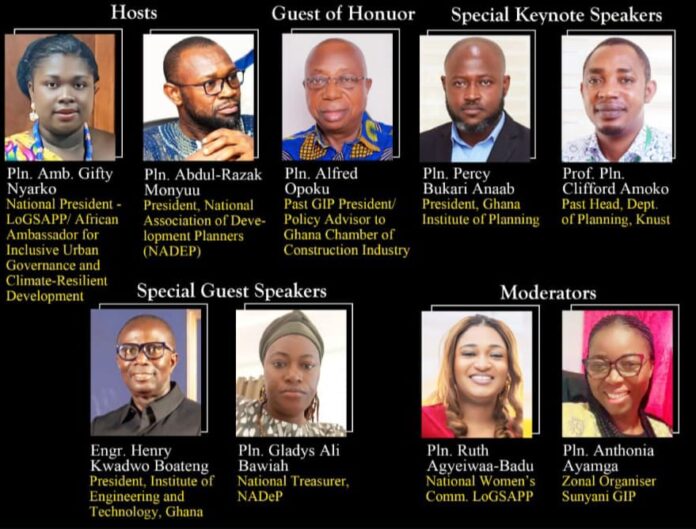At a recent gathering of built environment professionals, Engr. Henry Kwadwo Boateng, President of the Institution of Engineering and Technology, Ghana (IET-GH), delivered a compelling address on the theme, “With Planning We Can: Building Inclusive, Sustainable, and Resilient Communities.”
Engr. Boateng emphasized that progress is never accidental. It results from deliberate, coordinated, and well-informed planning — guided by foresight, grounded in sound engineering principles, and driven by collective responsibility.
He noted that the true strength of a community lies in how well it is designed, developed, and maintained. Without proper planning, even the most well-intentioned projects can lead to chaos, inequality, and vulnerability.
Highlighting flooding as one of the most visible signs of poor urban planning in Ghana’s cities, he observed that homes are submerged, roads destroyed, and lives disrupted year after year. He stressed that these floods are often not natural disasters but failures of planning and engineering.
“With proper hydrological studies, adequate drainage systems, and consistent maintenance,” he said, “these occurrences can be minimized.” He urged engineers to take the lead in designing integrated flood management systems that account for future rainfall trends and urban growth, advocating a proactive rather than reactive approach to infrastructure development.
On environmental health, Engr. Boateng remarked, “Our environment reflects our mindset.” He expressed concern over poor waste disposal practices that pollute water bodies and block drainage systems. He called for sustainable communities that prioritize efficient waste management — from household segregation to recycling and reuse — and challenged engineers to develop innovative waste-to-energy solutions. Stricter enforcement of environmental regulations, he added, is essential to maintain clean and healthy surroundings.
Emphasizing inclusiveness, the IET President highlighted the importance of accessibility. Properly planned and demarcated roads are crucial for connectivity, emergency response, and equitable development.
“When roads are constructed without proper layout or are encroached upon,” he warned, “communities become isolated, unsafe, and inefficient.” He urged stakeholders to enforce spatial development plans and engineering standards before construction begins, rather than addressing problems after they arise.
On environmental sustainability, Engr. Boateng advocated for urban forests, green belts, and tree-lined streets as essential infrastructure that reduces urban heat, absorbs carbon dioxide, and improves air quality. “A sustainable community,” he said, “must balance infrastructure with nature.” He called on engineers and planners to make environmental sustainability an integral part of every project, not an afterthought.
He further reminded his audience that even the best plans fail without people who understand and respect them. Building resilient communities requires citizens who value order, maintenance, and collective well-being, alongside strong institutions and law enforcement.
“Our institutions must uphold planning standards without compromise,” he stressed. Engineers, he added, must collaborate closely with local authorities to ensure compliance, safety, and accountability in all developments.
In his concluding remarks, Engr. Boateng described planning as more than a technical process — it is a vision for the future. Effective planning allows societies to build communities where infrastructure serves people, nature is respected, and progress is shared.
He reaffirmed the duty of built environment professionals to turn this vision into reality through science, ethics, and innovation.
“Indeed,” he emphasized, “with planning, we can build inclusive communities where no one is left behind; sustainable communities where growth does not destroy the environment; and resilient communities where people and infrastructure withstand change.”
Quoting a profound statement, he concluded:
“A nation that plans its cities well builds its future twice — first on paper, then in reality.”



